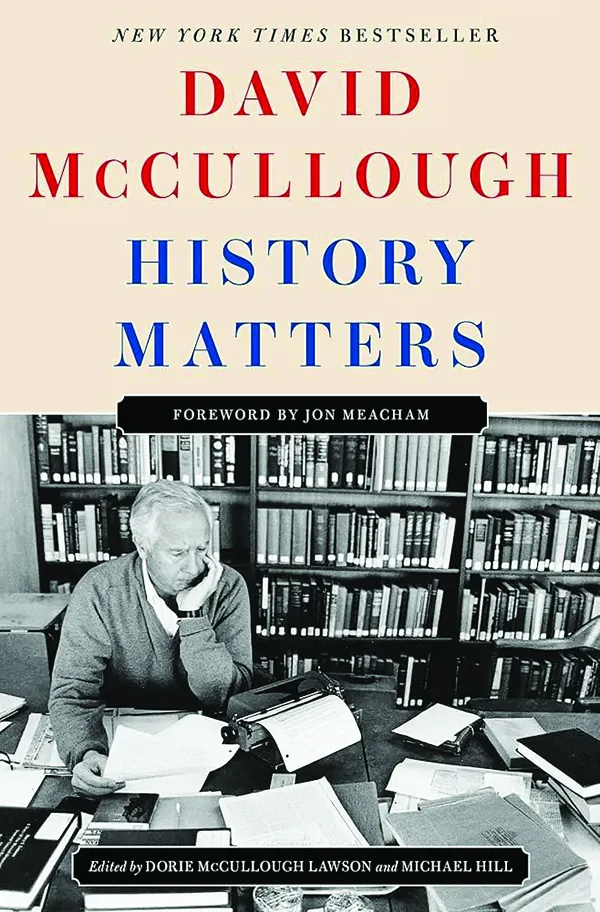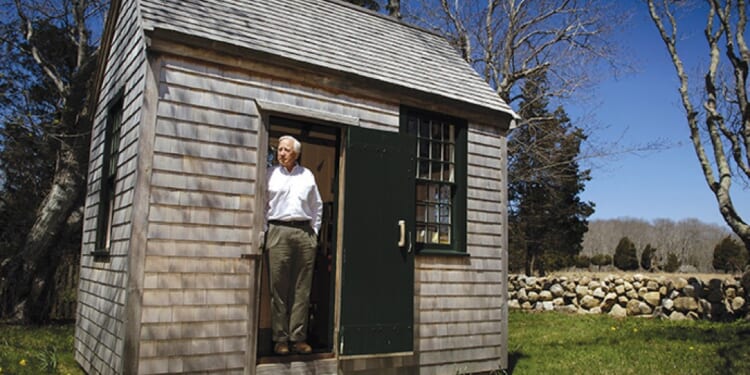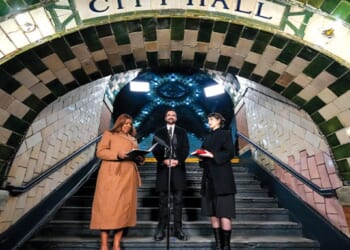With his white hair and Irish sweaters, reedy voice and reserved manner, his stately appearances on PBS, even the Cape Cod shack where he pecked out with four fingers every one of his books, his monuments, on a 1941 Royal typewriter he had purchased, secondhand, in 1965, David McCullough was the very picture of a historian. The genteel Pittsburgh native died at age 89 in 2022 as one of the bestselling historians and biographers in American history, recipient of 56 honorary degrees, the Pulitzer Prize and the National Book Award — twice each — and the Presidential Medal of Freedom, along with 120 other honors.
“How lucky we are, how very lucky we are, to live in this great country, to be Americans — Americans all,” concludes the first chapter in History Matters, the posthumous collection of writings and speeches published by McCullough’s daughter and longtime assistant, Dorie McCullough Lawson, and Michael Hill, the writer’s longtime researcher.
This expression of gratitude, of unbridled love for America, came in remarks delivered 27 years earlier when McCullough accepted the National Book Foundation Medal for Distinguished Contribution to American Letters. But this unabashed patriotism echoed throughout his life and works. “Our creative vitality has been an example for the world,” he marveled in a 1990 essay published in History Matters for the first time. “We make movies, music, medicines, trucks, toys, airplanes, paint, plate glass, and computers as does no one; we publish books, design and manufacture clothes, as does no one.” And he goes on, proud but not jingoistic:

“We are the people who built the Panama Canal and the Golden Gate Bridge, the Mount Wilson Observatory, the Library of Congress, Lincoln Center. We invented jazz and the general hospital. We grew strong making steel and automobiles. Our productive power turned the tide of world history in this century, in the Second World War. We are the people who devised Voyager II, the unmanned spacecraft that succeeded in photographing the planet Uranus, in the dark, while traveling at a speed of forty thousand miles an hour. Our public schools and great universities have long been considered the best in the world.”
So poisonous is our national discourse today — with every American verity that sustained us through the growth and triumphs enumerated above now under assault, somewhere, as patriarchal and oppressive — it is jarring to be reminded of the existence, not so long ago, of public figures, national treasures, whose invocations of Americana were central to their appeal, who were rewarded on bestseller lists and lecture stages without becoming a target of the forces, rampant today, that seem bent on tearing down all vestiges of a shared and proud national heritage.
Only a few other such figures come to mind: Jackie Robinson, Walter Cronkite, Charles Schulz, and Fred Rogers. And in each case, one shudders to think what reception would await these heroes, once considered so unifying, in today’s anger-driven social media culture, with its purity tests and dividing lines. In one of his final commencement addresses, at Providence College in 2018, McCullough urged the graduates, already steeped in that culture, to “count kindness as all-important,” to “take interest in those around you,” and, at all points — heresy! — to believe the best about America.
“How lucky we all are to live in this great country, where freedom of speech, the rule of law, and representative government remain the way of life. Where the love of learning holds strong. Where there are public libraries free to the people in virtually every city and town. No less than seventeen hundred public libraries.”
To readers of McCullough’s deeply researched, elegantly narrated works, this overt patriotism, this wonderment at the glories of the American experiment, will be nothing new. History Matters delivers lots of fun anecdotes and revelations about how the master’s literary landmarks came to be: the young writer’s discovery of the unpublished photograph collection that gave rise to The Johnstown Flood (1969); the older McCullough’s decision to retrace the steps of Harry Truman as he strode from House Speaker Sam Rayburn’s “hideaway” office at the Capitol to the car that took the vice president to the White House Cabinet Room to be sworn in, following the death of Franklin Roosevelt, as the 33rd president of the United States.
Nowhere in these speeches and writings does McCullough apologize for America. Never does our most revered historian caveat his odes to American greatness with instant reference to the country’s failings, our undeniable legacy of injustices, which some would prefer to see exalted as the dominant feature of our history, of our national identity. Rather than judge the Founders by contemporary standards, McCullough urged scholars to “remember you’re writing about people who … were living in the present, their present, much like we do,” and accordingly to “see the world as it was to those vanished people.”
To be sure, McCullough expressed worry about Americans’ declining literacy and impoverished civics. “If the gap between the educated and the uneducated in America continues to grow as it has in our time, as fast as or faster than the gap between the rich and the poor,” he warned, “the gap between the educated and the uneducated is going to be of greater consequence and the more serious threat to our way of life. We must not, by any means, misunderstand that.”
It was to McCullough’s credit that he refrained from overtly politicizing his observations. Still, it is difficult to imagine that this towering public intellectual, a revered lecturer at Wesleyan, Cornell, and Dartmouth, meant to exempt any critical stakeholder, such as the teachers’ unions, from his sorrowful call for the U.S. to “devise an educational system that does far more than is being done at the present to reward students in the school system from grade one on.”
COCKTAIL HEROES: REVIEW OF ‘THE COMIC BOOK HISTORY OF THE COCKTAIL’ BY DAVID WONDRICH
The only subject on which these writings reflect a passion greater than the author’s love of America is history itself. History Matters makes the strongest case for the enduring value of teaching, learning, and writing about those who came before us. McCullough seemed to feel confident that those who follow in his footsteps, as he did Truman’s, by becoming historians, by examining documents and going places and interviewing witnesses, will arrive at the same place he did: swear the same allegiance to America, to the undeniable greatness of its history.
“Insight comes more often than not,” McCullough remarked in an interview in The Paris Review in 1999, “from looking at what’s been on the table all along in front of everybody rather than from discovering something new.”
James Rosen is chief Washington correspondent at Newsmax and the author of the forthcoming Scalia: Supreme Court Years, 1986-2001.

















